Commercial Law Assignment: Contract, Agency, and Sales of Goods
VerifiedAdded on 2023/04/22
|17
|3500
|226
Homework Assignment
AI Summary
This document presents a comprehensive solution to a commercial law assignment, addressing various key concepts within the field. The assignment covers several critical areas of commercial law, including the neighbor principle, contributory negligence, and the formation of contracts under the Contracts Act 1950. It further explores the principles of sales of goods, exceptions to the nemo dat quod non habet rule, and the capacity to contract, particularly in the context of minors. The assignment also provides an analysis of contract frustration and the duties and liabilities within an agency relationship, including scenarios of misconduct and bribery. Finally, it delves into the role of guarantors in hire purchase agreements. The solutions provided demonstrate a solid understanding of legal principles and relevant case laws.
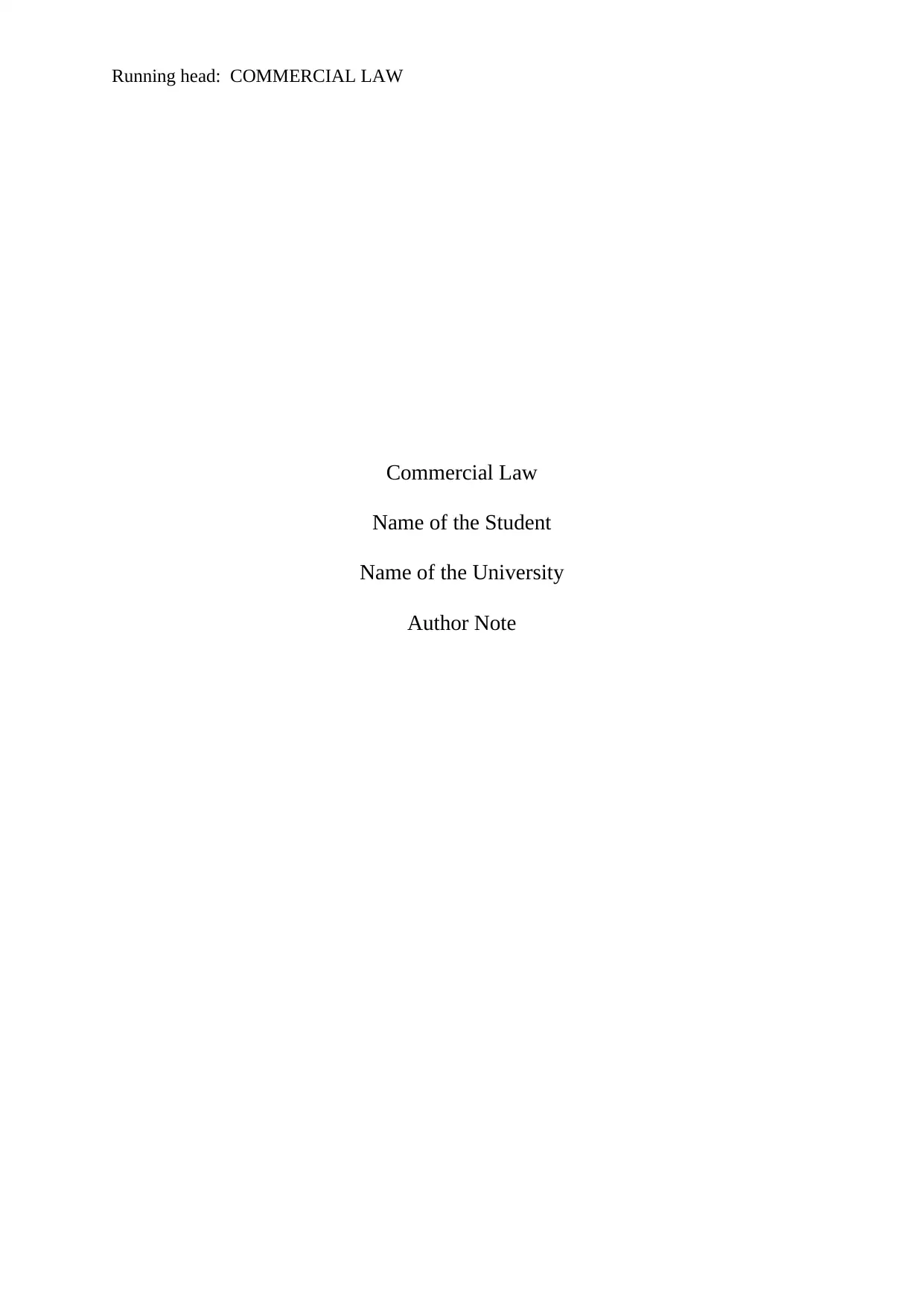
Running head: COMMERCIAL LAW
Commercial Law
Name of the Student
Name of the University
Author Note
Commercial Law
Name of the Student
Name of the University
Author Note
Paraphrase This Document
Need a fresh take? Get an instant paraphrase of this document with our AI Paraphraser
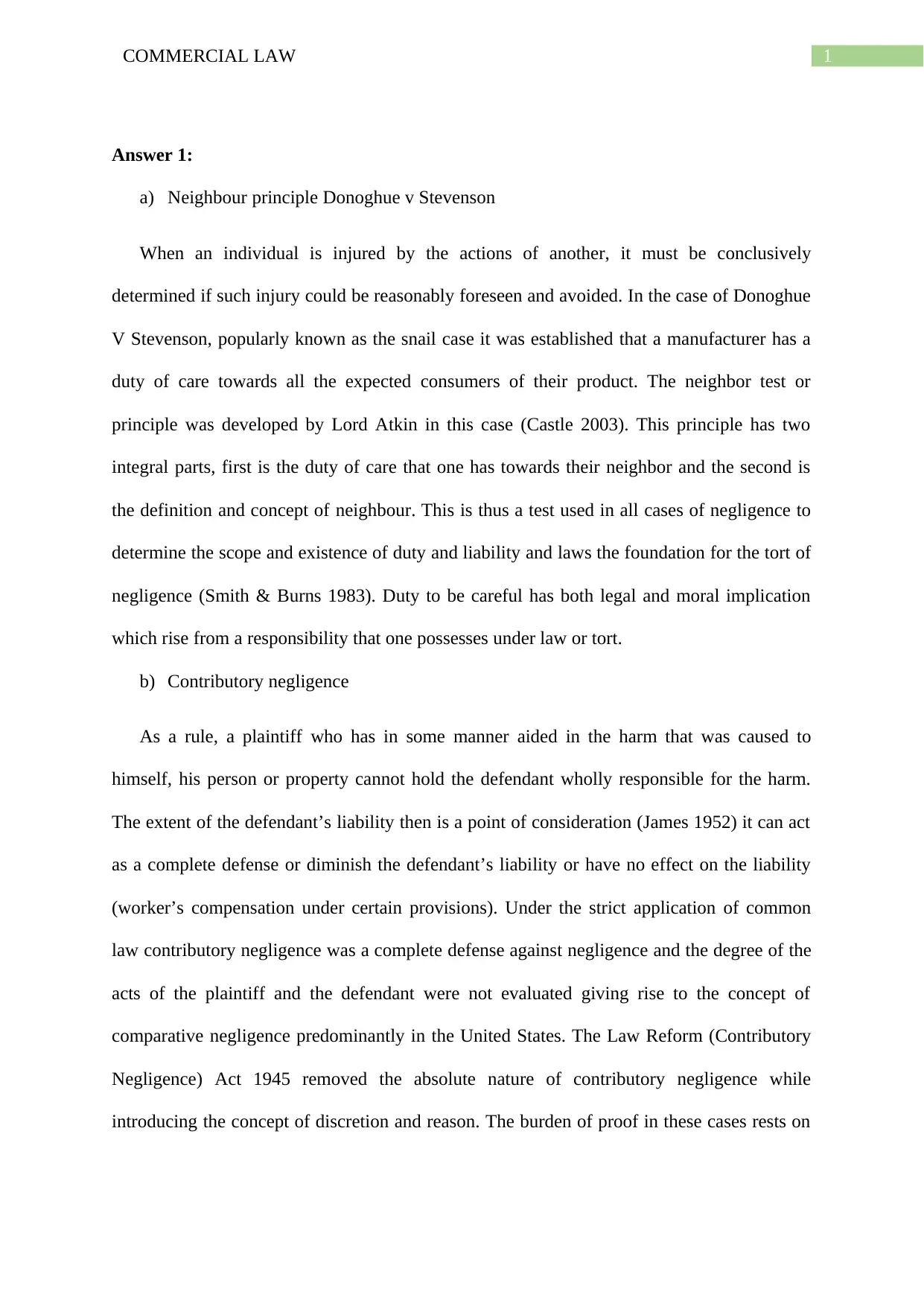
1COMMERCIAL LAW
Answer 1:
a) Neighbour principle Donoghue v Stevenson
When an individual is injured by the actions of another, it must be conclusively
determined if such injury could be reasonably foreseen and avoided. In the case of Donoghue
V Stevenson, popularly known as the snail case it was established that a manufacturer has a
duty of care towards all the expected consumers of their product. The neighbor test or
principle was developed by Lord Atkin in this case (Castle 2003). This principle has two
integral parts, first is the duty of care that one has towards their neighbor and the second is
the definition and concept of neighbour. This is thus a test used in all cases of negligence to
determine the scope and existence of duty and liability and laws the foundation for the tort of
negligence (Smith & Burns 1983). Duty to be careful has both legal and moral implication
which rise from a responsibility that one possesses under law or tort.
b) Contributory negligence
As a rule, a plaintiff who has in some manner aided in the harm that was caused to
himself, his person or property cannot hold the defendant wholly responsible for the harm.
The extent of the defendant’s liability then is a point of consideration (James 1952) it can act
as a complete defense or diminish the defendant’s liability or have no effect on the liability
(worker’s compensation under certain provisions). Under the strict application of common
law contributory negligence was a complete defense against negligence and the degree of the
acts of the plaintiff and the defendant were not evaluated giving rise to the concept of
comparative negligence predominantly in the United States. The Law Reform (Contributory
Negligence) Act 1945 removed the absolute nature of contributory negligence while
introducing the concept of discretion and reason. The burden of proof in these cases rests on
Answer 1:
a) Neighbour principle Donoghue v Stevenson
When an individual is injured by the actions of another, it must be conclusively
determined if such injury could be reasonably foreseen and avoided. In the case of Donoghue
V Stevenson, popularly known as the snail case it was established that a manufacturer has a
duty of care towards all the expected consumers of their product. The neighbor test or
principle was developed by Lord Atkin in this case (Castle 2003). This principle has two
integral parts, first is the duty of care that one has towards their neighbor and the second is
the definition and concept of neighbour. This is thus a test used in all cases of negligence to
determine the scope and existence of duty and liability and laws the foundation for the tort of
negligence (Smith & Burns 1983). Duty to be careful has both legal and moral implication
which rise from a responsibility that one possesses under law or tort.
b) Contributory negligence
As a rule, a plaintiff who has in some manner aided in the harm that was caused to
himself, his person or property cannot hold the defendant wholly responsible for the harm.
The extent of the defendant’s liability then is a point of consideration (James 1952) it can act
as a complete defense or diminish the defendant’s liability or have no effect on the liability
(worker’s compensation under certain provisions). Under the strict application of common
law contributory negligence was a complete defense against negligence and the degree of the
acts of the plaintiff and the defendant were not evaluated giving rise to the concept of
comparative negligence predominantly in the United States. The Law Reform (Contributory
Negligence) Act 1945 removed the absolute nature of contributory negligence while
introducing the concept of discretion and reason. The burden of proof in these cases rests on

2COMMERCIAL LAW
the defendant to show that the plaintiff failed to care for themselves thus causing the harm
and not just the incident Capps V Miller.
the defendant to show that the plaintiff failed to care for themselves thus causing the harm
and not just the incident Capps V Miller.
⊘ This is a preview!⊘
Do you want full access?
Subscribe today to unlock all pages.

Trusted by 1+ million students worldwide
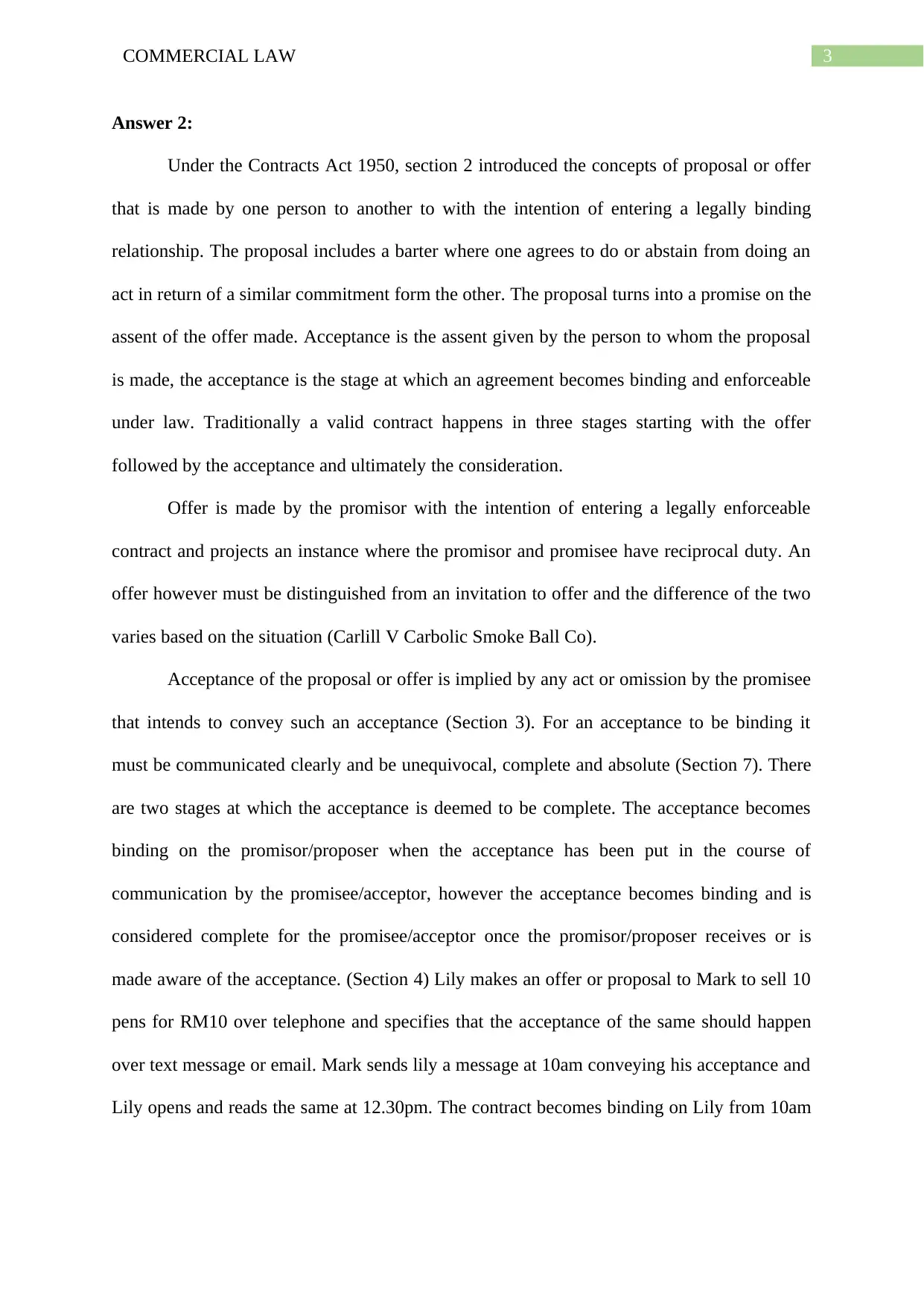
3COMMERCIAL LAW
Answer 2:
Under the Contracts Act 1950, section 2 introduced the concepts of proposal or offer
that is made by one person to another to with the intention of entering a legally binding
relationship. The proposal includes a barter where one agrees to do or abstain from doing an
act in return of a similar commitment form the other. The proposal turns into a promise on the
assent of the offer made. Acceptance is the assent given by the person to whom the proposal
is made, the acceptance is the stage at which an agreement becomes binding and enforceable
under law. Traditionally a valid contract happens in three stages starting with the offer
followed by the acceptance and ultimately the consideration.
Offer is made by the promisor with the intention of entering a legally enforceable
contract and projects an instance where the promisor and promisee have reciprocal duty. An
offer however must be distinguished from an invitation to offer and the difference of the two
varies based on the situation (Carlill V Carbolic Smoke Ball Co).
Acceptance of the proposal or offer is implied by any act or omission by the promisee
that intends to convey such an acceptance (Section 3). For an acceptance to be binding it
must be communicated clearly and be unequivocal, complete and absolute (Section 7). There
are two stages at which the acceptance is deemed to be complete. The acceptance becomes
binding on the promisor/proposer when the acceptance has been put in the course of
communication by the promisee/acceptor, however the acceptance becomes binding and is
considered complete for the promisee/acceptor once the promisor/proposer receives or is
made aware of the acceptance. (Section 4) Lily makes an offer or proposal to Mark to sell 10
pens for RM10 over telephone and specifies that the acceptance of the same should happen
over text message or email. Mark sends lily a message at 10am conveying his acceptance and
Lily opens and reads the same at 12.30pm. The contract becomes binding on Lily from 10am
Answer 2:
Under the Contracts Act 1950, section 2 introduced the concepts of proposal or offer
that is made by one person to another to with the intention of entering a legally binding
relationship. The proposal includes a barter where one agrees to do or abstain from doing an
act in return of a similar commitment form the other. The proposal turns into a promise on the
assent of the offer made. Acceptance is the assent given by the person to whom the proposal
is made, the acceptance is the stage at which an agreement becomes binding and enforceable
under law. Traditionally a valid contract happens in three stages starting with the offer
followed by the acceptance and ultimately the consideration.
Offer is made by the promisor with the intention of entering a legally enforceable
contract and projects an instance where the promisor and promisee have reciprocal duty. An
offer however must be distinguished from an invitation to offer and the difference of the two
varies based on the situation (Carlill V Carbolic Smoke Ball Co).
Acceptance of the proposal or offer is implied by any act or omission by the promisee
that intends to convey such an acceptance (Section 3). For an acceptance to be binding it
must be communicated clearly and be unequivocal, complete and absolute (Section 7). There
are two stages at which the acceptance is deemed to be complete. The acceptance becomes
binding on the promisor/proposer when the acceptance has been put in the course of
communication by the promisee/acceptor, however the acceptance becomes binding and is
considered complete for the promisee/acceptor once the promisor/proposer receives or is
made aware of the acceptance. (Section 4) Lily makes an offer or proposal to Mark to sell 10
pens for RM10 over telephone and specifies that the acceptance of the same should happen
over text message or email. Mark sends lily a message at 10am conveying his acceptance and
Lily opens and reads the same at 12.30pm. The contract becomes binding on Lily from 10am
Paraphrase This Document
Need a fresh take? Get an instant paraphrase of this document with our AI Paraphraser

4COMMERCIAL LAW
when Mark sends the message, and is binding on Mark from 12.30pm when Lily checks the
message. Any act done as a response to the offer can also amount to acceptance (Section 8).
when Mark sends the message, and is binding on Mark from 12.30pm when Lily checks the
message. Any act done as a response to the offer can also amount to acceptance (Section 8).
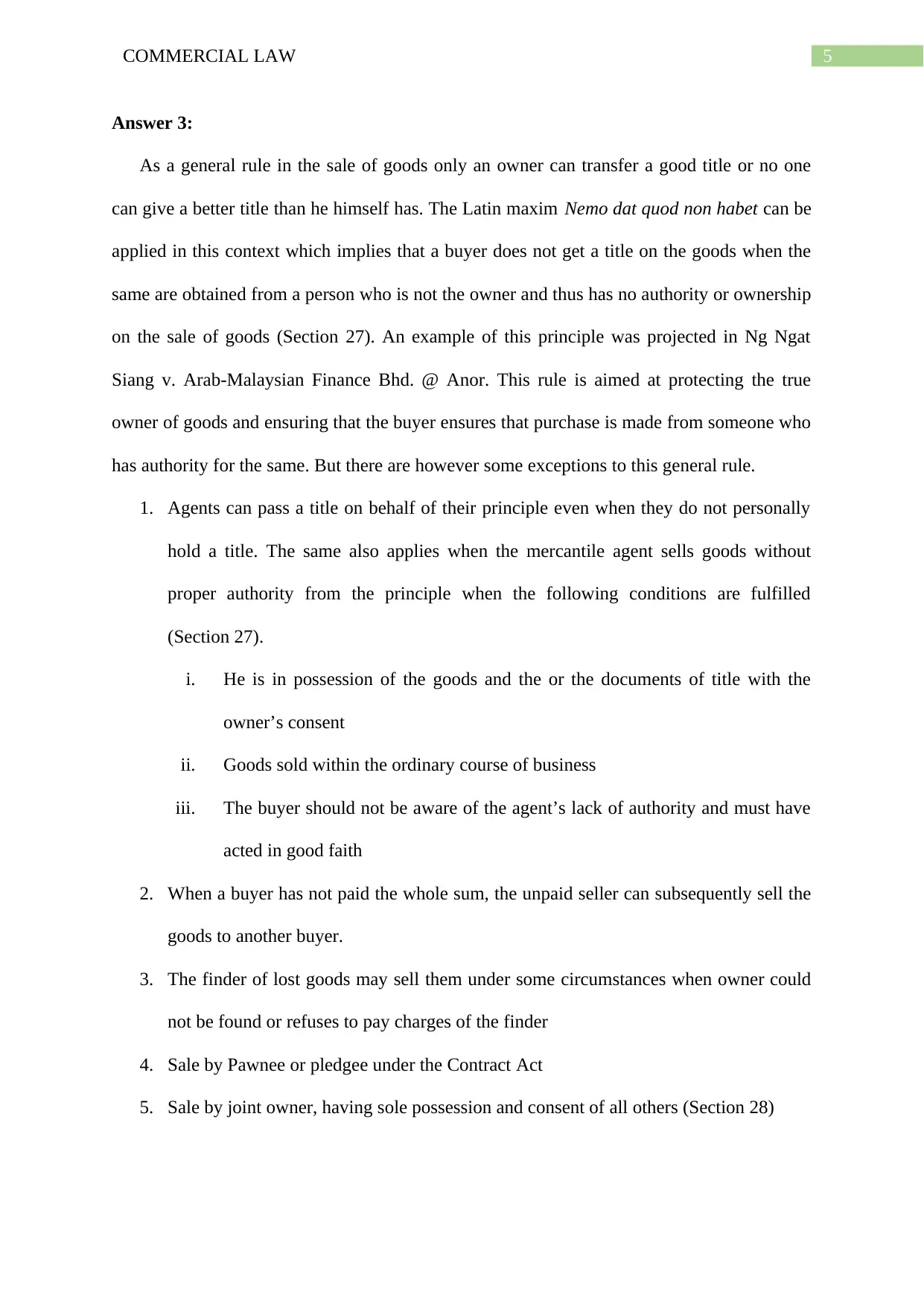
5COMMERCIAL LAW
Answer 3:
As a general rule in the sale of goods only an owner can transfer a good title or no one
can give a better title than he himself has. The Latin maxim Nemo dat quod non habet can be
applied in this context which implies that a buyer does not get a title on the goods when the
same are obtained from a person who is not the owner and thus has no authority or ownership
on the sale of goods (Section 27). An example of this principle was projected in Ng Ngat
Siang v. Arab-Malaysian Finance Bhd. @ Anor. This rule is aimed at protecting the true
owner of goods and ensuring that the buyer ensures that purchase is made from someone who
has authority for the same. But there are however some exceptions to this general rule.
1. Agents can pass a title on behalf of their principle even when they do not personally
hold a title. The same also applies when the mercantile agent sells goods without
proper authority from the principle when the following conditions are fulfilled
(Section 27).
i. He is in possession of the goods and the or the documents of title with the
owner’s consent
ii. Goods sold within the ordinary course of business
iii. The buyer should not be aware of the agent’s lack of authority and must have
acted in good faith
2. When a buyer has not paid the whole sum, the unpaid seller can subsequently sell the
goods to another buyer.
3. The finder of lost goods may sell them under some circumstances when owner could
not be found or refuses to pay charges of the finder
4. Sale by Pawnee or pledgee under the Contract Act
5. Sale by joint owner, having sole possession and consent of all others (Section 28)
Answer 3:
As a general rule in the sale of goods only an owner can transfer a good title or no one
can give a better title than he himself has. The Latin maxim Nemo dat quod non habet can be
applied in this context which implies that a buyer does not get a title on the goods when the
same are obtained from a person who is not the owner and thus has no authority or ownership
on the sale of goods (Section 27). An example of this principle was projected in Ng Ngat
Siang v. Arab-Malaysian Finance Bhd. @ Anor. This rule is aimed at protecting the true
owner of goods and ensuring that the buyer ensures that purchase is made from someone who
has authority for the same. But there are however some exceptions to this general rule.
1. Agents can pass a title on behalf of their principle even when they do not personally
hold a title. The same also applies when the mercantile agent sells goods without
proper authority from the principle when the following conditions are fulfilled
(Section 27).
i. He is in possession of the goods and the or the documents of title with the
owner’s consent
ii. Goods sold within the ordinary course of business
iii. The buyer should not be aware of the agent’s lack of authority and must have
acted in good faith
2. When a buyer has not paid the whole sum, the unpaid seller can subsequently sell the
goods to another buyer.
3. The finder of lost goods may sell them under some circumstances when owner could
not be found or refuses to pay charges of the finder
4. Sale by Pawnee or pledgee under the Contract Act
5. Sale by joint owner, having sole possession and consent of all others (Section 28)
⊘ This is a preview!⊘
Do you want full access?
Subscribe today to unlock all pages.

Trusted by 1+ million students worldwide
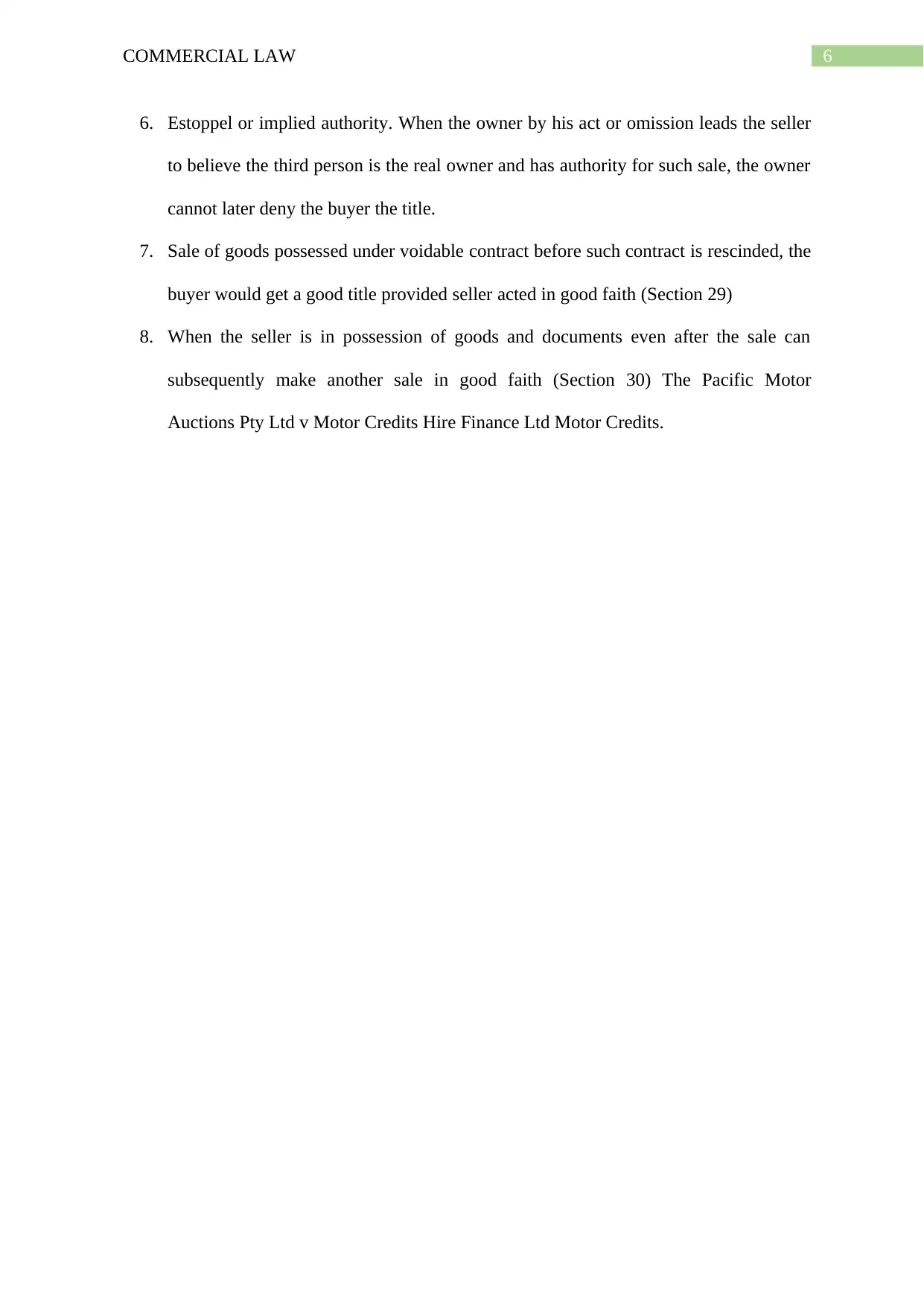
6COMMERCIAL LAW
6. Estoppel or implied authority. When the owner by his act or omission leads the seller
to believe the third person is the real owner and has authority for such sale, the owner
cannot later deny the buyer the title.
7. Sale of goods possessed under voidable contract before such contract is rescinded, the
buyer would get a good title provided seller acted in good faith (Section 29)
8. When the seller is in possession of goods and documents even after the sale can
subsequently make another sale in good faith (Section 30) The Pacific Motor
Auctions Pty Ltd v Motor Credits Hire Finance Ltd Motor Credits.
6. Estoppel or implied authority. When the owner by his act or omission leads the seller
to believe the third person is the real owner and has authority for such sale, the owner
cannot later deny the buyer the title.
7. Sale of goods possessed under voidable contract before such contract is rescinded, the
buyer would get a good title provided seller acted in good faith (Section 29)
8. When the seller is in possession of goods and documents even after the sale can
subsequently make another sale in good faith (Section 30) The Pacific Motor
Auctions Pty Ltd v Motor Credits Hire Finance Ltd Motor Credits.
Paraphrase This Document
Need a fresh take? Get an instant paraphrase of this document with our AI Paraphraser
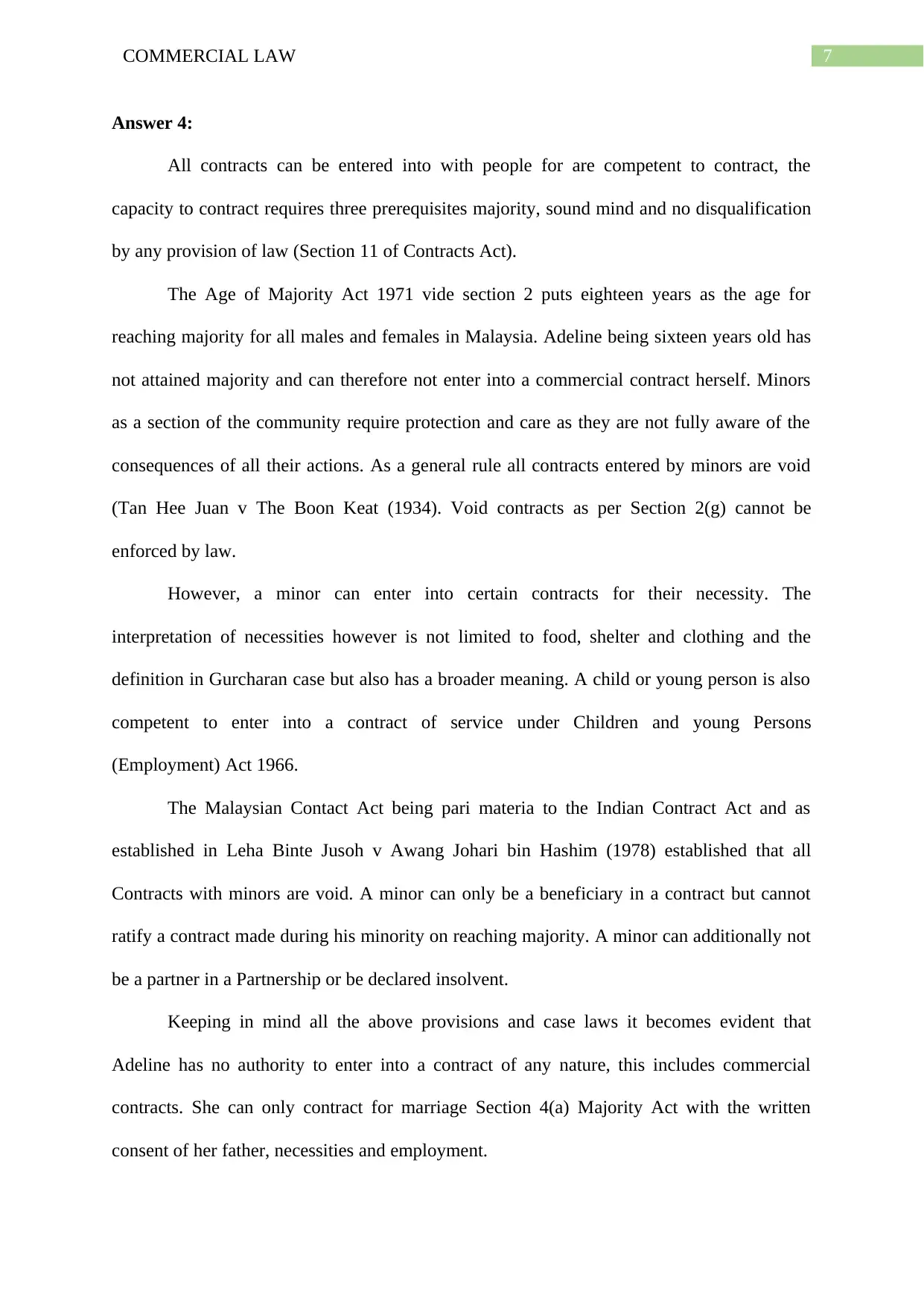
7COMMERCIAL LAW
Answer 4:
All contracts can be entered into with people for are competent to contract, the
capacity to contract requires three prerequisites majority, sound mind and no disqualification
by any provision of law (Section 11 of Contracts Act).
The Age of Majority Act 1971 vide section 2 puts eighteen years as the age for
reaching majority for all males and females in Malaysia. Adeline being sixteen years old has
not attained majority and can therefore not enter into a commercial contract herself. Minors
as a section of the community require protection and care as they are not fully aware of the
consequences of all their actions. As a general rule all contracts entered by minors are void
(Tan Hee Juan v The Boon Keat (1934). Void contracts as per Section 2(g) cannot be
enforced by law.
However, a minor can enter into certain contracts for their necessity. The
interpretation of necessities however is not limited to food, shelter and clothing and the
definition in Gurcharan case but also has a broader meaning. A child or young person is also
competent to enter into a contract of service under Children and young Persons
(Employment) Act 1966.
The Malaysian Contact Act being pari materia to the Indian Contract Act and as
established in Leha Binte Jusoh v Awang Johari bin Hashim (1978) established that all
Contracts with minors are void. A minor can only be a beneficiary in a contract but cannot
ratify a contract made during his minority on reaching majority. A minor can additionally not
be a partner in a Partnership or be declared insolvent.
Keeping in mind all the above provisions and case laws it becomes evident that
Adeline has no authority to enter into a contract of any nature, this includes commercial
contracts. She can only contract for marriage Section 4(a) Majority Act with the written
consent of her father, necessities and employment.
Answer 4:
All contracts can be entered into with people for are competent to contract, the
capacity to contract requires three prerequisites majority, sound mind and no disqualification
by any provision of law (Section 11 of Contracts Act).
The Age of Majority Act 1971 vide section 2 puts eighteen years as the age for
reaching majority for all males and females in Malaysia. Adeline being sixteen years old has
not attained majority and can therefore not enter into a commercial contract herself. Minors
as a section of the community require protection and care as they are not fully aware of the
consequences of all their actions. As a general rule all contracts entered by minors are void
(Tan Hee Juan v The Boon Keat (1934). Void contracts as per Section 2(g) cannot be
enforced by law.
However, a minor can enter into certain contracts for their necessity. The
interpretation of necessities however is not limited to food, shelter and clothing and the
definition in Gurcharan case but also has a broader meaning. A child or young person is also
competent to enter into a contract of service under Children and young Persons
(Employment) Act 1966.
The Malaysian Contact Act being pari materia to the Indian Contract Act and as
established in Leha Binte Jusoh v Awang Johari bin Hashim (1978) established that all
Contracts with minors are void. A minor can only be a beneficiary in a contract but cannot
ratify a contract made during his minority on reaching majority. A minor can additionally not
be a partner in a Partnership or be declared insolvent.
Keeping in mind all the above provisions and case laws it becomes evident that
Adeline has no authority to enter into a contract of any nature, this includes commercial
contracts. She can only contract for marriage Section 4(a) Majority Act with the written
consent of her father, necessities and employment.

8COMMERCIAL LAW
⊘ This is a preview!⊘
Do you want full access?
Subscribe today to unlock all pages.

Trusted by 1+ million students worldwide
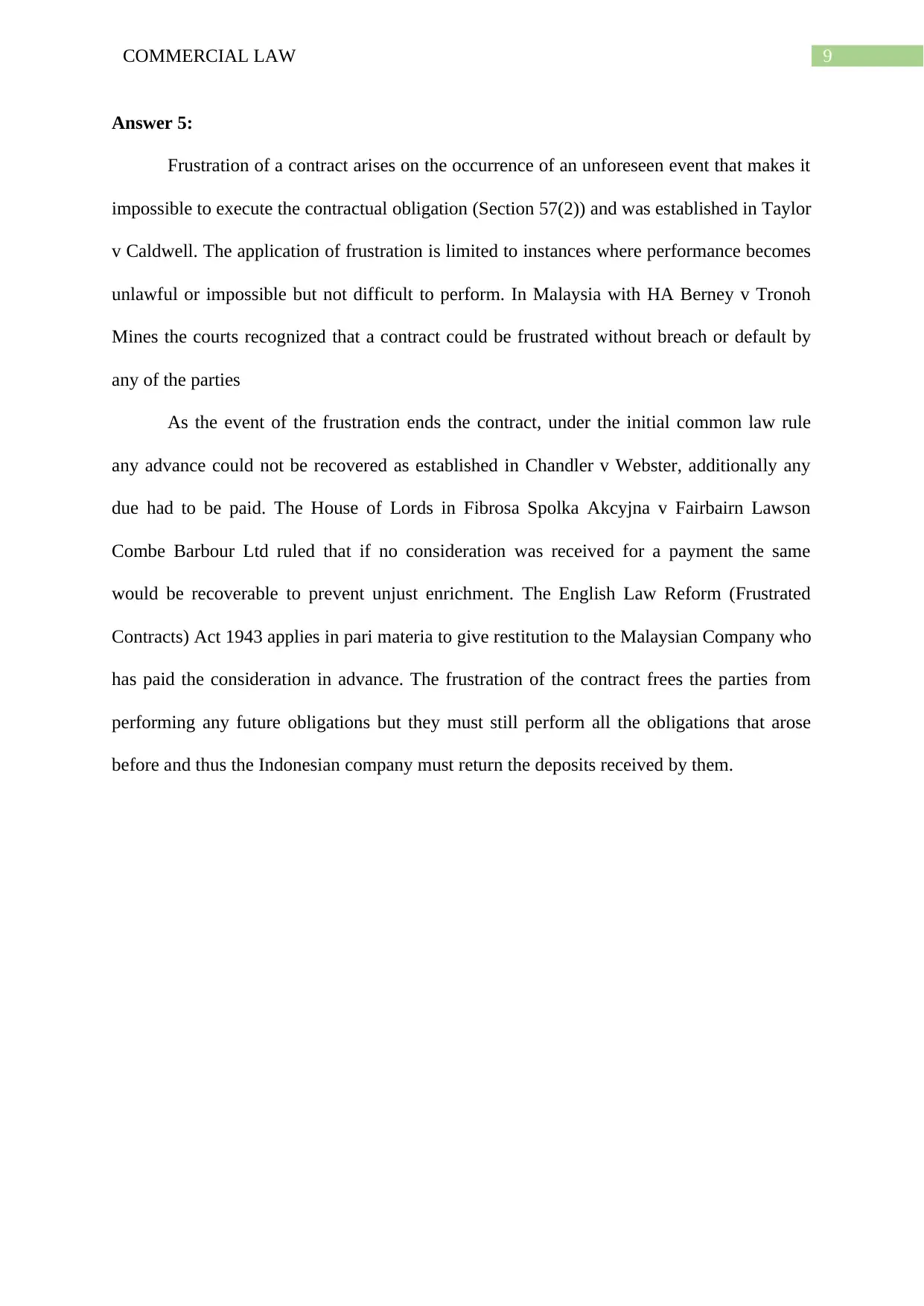
9COMMERCIAL LAW
Answer 5:
Frustration of a contract arises on the occurrence of an unforeseen event that makes it
impossible to execute the contractual obligation (Section 57(2)) and was established in Taylor
v Caldwell. The application of frustration is limited to instances where performance becomes
unlawful or impossible but not difficult to perform. In Malaysia with HA Berney v Tronoh
Mines the courts recognized that a contract could be frustrated without breach or default by
any of the parties
As the event of the frustration ends the contract, under the initial common law rule
any advance could not be recovered as established in Chandler v Webster, additionally any
due had to be paid. The House of Lords in Fibrosa Spolka Akcyjna v Fairbairn Lawson
Combe Barbour Ltd ruled that if no consideration was received for a payment the same
would be recoverable to prevent unjust enrichment. The English Law Reform (Frustrated
Contracts) Act 1943 applies in pari materia to give restitution to the Malaysian Company who
has paid the consideration in advance. The frustration of the contract frees the parties from
performing any future obligations but they must still perform all the obligations that arose
before and thus the Indonesian company must return the deposits received by them.
Answer 5:
Frustration of a contract arises on the occurrence of an unforeseen event that makes it
impossible to execute the contractual obligation (Section 57(2)) and was established in Taylor
v Caldwell. The application of frustration is limited to instances where performance becomes
unlawful or impossible but not difficult to perform. In Malaysia with HA Berney v Tronoh
Mines the courts recognized that a contract could be frustrated without breach or default by
any of the parties
As the event of the frustration ends the contract, under the initial common law rule
any advance could not be recovered as established in Chandler v Webster, additionally any
due had to be paid. The House of Lords in Fibrosa Spolka Akcyjna v Fairbairn Lawson
Combe Barbour Ltd ruled that if no consideration was received for a payment the same
would be recoverable to prevent unjust enrichment. The English Law Reform (Frustrated
Contracts) Act 1943 applies in pari materia to give restitution to the Malaysian Company who
has paid the consideration in advance. The frustration of the contract frees the parties from
performing any future obligations but they must still perform all the obligations that arose
before and thus the Indonesian company must return the deposits received by them.
Paraphrase This Document
Need a fresh take? Get an instant paraphrase of this document with our AI Paraphraser
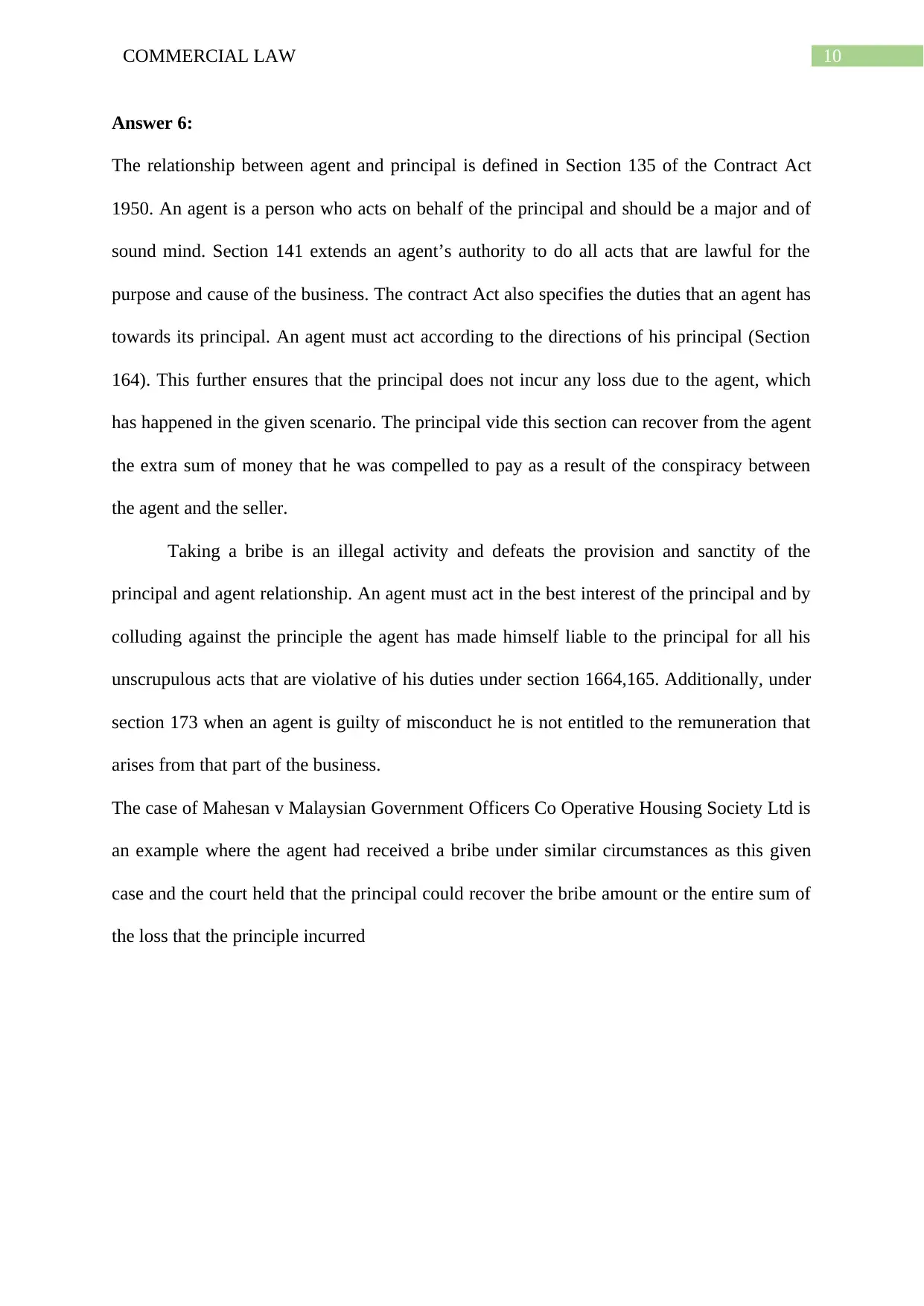
10COMMERCIAL LAW
Answer 6:
The relationship between agent and principal is defined in Section 135 of the Contract Act
1950. An agent is a person who acts on behalf of the principal and should be a major and of
sound mind. Section 141 extends an agent’s authority to do all acts that are lawful for the
purpose and cause of the business. The contract Act also specifies the duties that an agent has
towards its principal. An agent must act according to the directions of his principal (Section
164). This further ensures that the principal does not incur any loss due to the agent, which
has happened in the given scenario. The principal vide this section can recover from the agent
the extra sum of money that he was compelled to pay as a result of the conspiracy between
the agent and the seller.
Taking a bribe is an illegal activity and defeats the provision and sanctity of the
principal and agent relationship. An agent must act in the best interest of the principal and by
colluding against the principle the agent has made himself liable to the principal for all his
unscrupulous acts that are violative of his duties under section 1664,165. Additionally, under
section 173 when an agent is guilty of misconduct he is not entitled to the remuneration that
arises from that part of the business.
The case of Mahesan v Malaysian Government Officers Co Operative Housing Society Ltd is
an example where the agent had received a bribe under similar circumstances as this given
case and the court held that the principal could recover the bribe amount or the entire sum of
the loss that the principle incurred
Answer 6:
The relationship between agent and principal is defined in Section 135 of the Contract Act
1950. An agent is a person who acts on behalf of the principal and should be a major and of
sound mind. Section 141 extends an agent’s authority to do all acts that are lawful for the
purpose and cause of the business. The contract Act also specifies the duties that an agent has
towards its principal. An agent must act according to the directions of his principal (Section
164). This further ensures that the principal does not incur any loss due to the agent, which
has happened in the given scenario. The principal vide this section can recover from the agent
the extra sum of money that he was compelled to pay as a result of the conspiracy between
the agent and the seller.
Taking a bribe is an illegal activity and defeats the provision and sanctity of the
principal and agent relationship. An agent must act in the best interest of the principal and by
colluding against the principle the agent has made himself liable to the principal for all his
unscrupulous acts that are violative of his duties under section 1664,165. Additionally, under
section 173 when an agent is guilty of misconduct he is not entitled to the remuneration that
arises from that part of the business.
The case of Mahesan v Malaysian Government Officers Co Operative Housing Society Ltd is
an example where the agent had received a bribe under similar circumstances as this given
case and the court held that the principal could recover the bribe amount or the entire sum of
the loss that the principle incurred
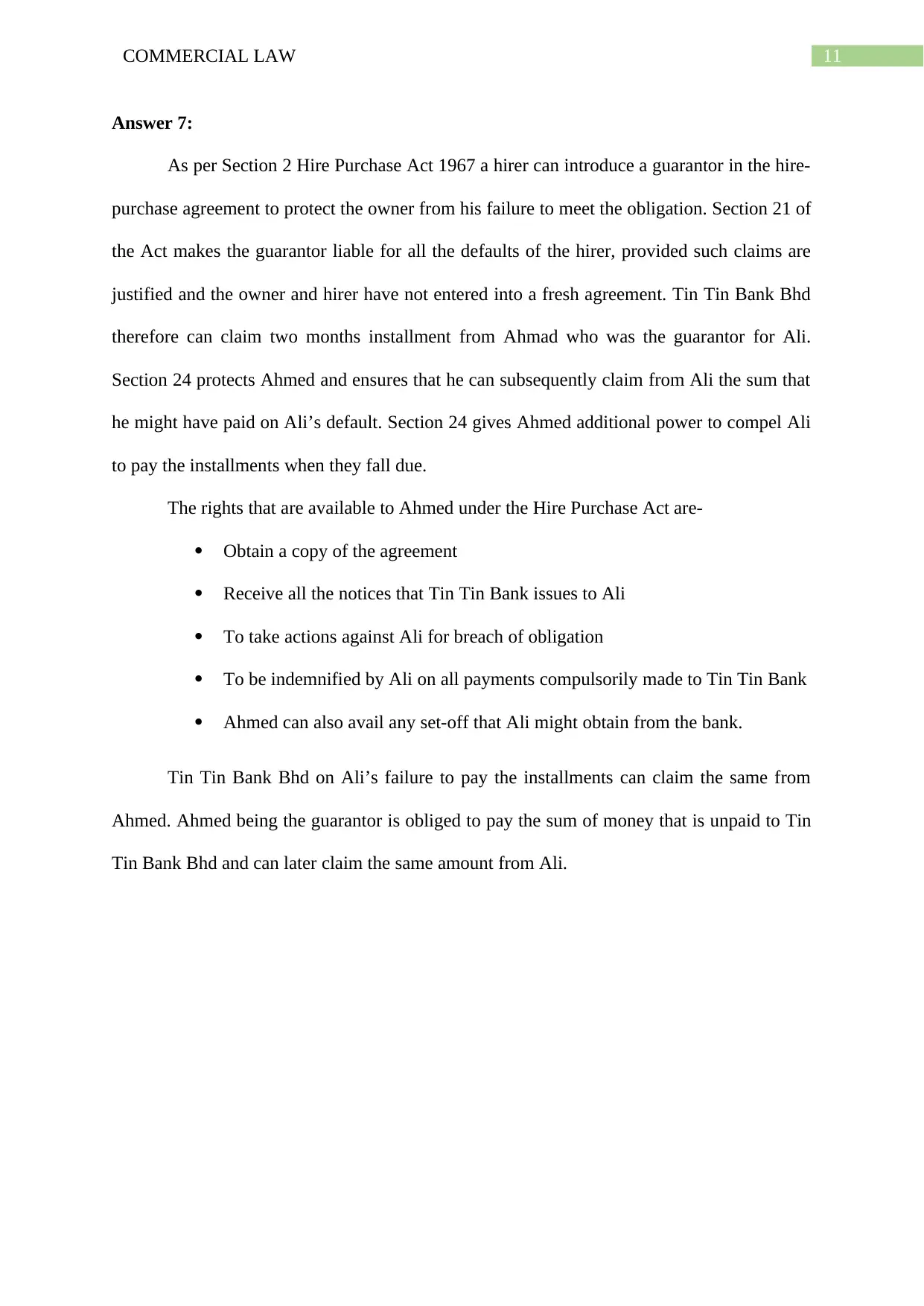
11COMMERCIAL LAW
Answer 7:
As per Section 2 Hire Purchase Act 1967 a hirer can introduce a guarantor in the hire-
purchase agreement to protect the owner from his failure to meet the obligation. Section 21 of
the Act makes the guarantor liable for all the defaults of the hirer, provided such claims are
justified and the owner and hirer have not entered into a fresh agreement. Tin Tin Bank Bhd
therefore can claim two months installment from Ahmad who was the guarantor for Ali.
Section 24 protects Ahmed and ensures that he can subsequently claim from Ali the sum that
he might have paid on Ali’s default. Section 24 gives Ahmed additional power to compel Ali
to pay the installments when they fall due.
The rights that are available to Ahmed under the Hire Purchase Act are-
Obtain a copy of the agreement
Receive all the notices that Tin Tin Bank issues to Ali
To take actions against Ali for breach of obligation
To be indemnified by Ali on all payments compulsorily made to Tin Tin Bank
Ahmed can also avail any set-off that Ali might obtain from the bank.
Tin Tin Bank Bhd on Ali’s failure to pay the installments can claim the same from
Ahmed. Ahmed being the guarantor is obliged to pay the sum of money that is unpaid to Tin
Tin Bank Bhd and can later claim the same amount from Ali.
Answer 7:
As per Section 2 Hire Purchase Act 1967 a hirer can introduce a guarantor in the hire-
purchase agreement to protect the owner from his failure to meet the obligation. Section 21 of
the Act makes the guarantor liable for all the defaults of the hirer, provided such claims are
justified and the owner and hirer have not entered into a fresh agreement. Tin Tin Bank Bhd
therefore can claim two months installment from Ahmad who was the guarantor for Ali.
Section 24 protects Ahmed and ensures that he can subsequently claim from Ali the sum that
he might have paid on Ali’s default. Section 24 gives Ahmed additional power to compel Ali
to pay the installments when they fall due.
The rights that are available to Ahmed under the Hire Purchase Act are-
Obtain a copy of the agreement
Receive all the notices that Tin Tin Bank issues to Ali
To take actions against Ali for breach of obligation
To be indemnified by Ali on all payments compulsorily made to Tin Tin Bank
Ahmed can also avail any set-off that Ali might obtain from the bank.
Tin Tin Bank Bhd on Ali’s failure to pay the installments can claim the same from
Ahmed. Ahmed being the guarantor is obliged to pay the sum of money that is unpaid to Tin
Tin Bank Bhd and can later claim the same amount from Ali.
⊘ This is a preview!⊘
Do you want full access?
Subscribe today to unlock all pages.

Trusted by 1+ million students worldwide
1 out of 17
Related Documents
Your All-in-One AI-Powered Toolkit for Academic Success.
+13062052269
info@desklib.com
Available 24*7 on WhatsApp / Email
![[object Object]](/_next/static/media/star-bottom.7253800d.svg)
Unlock your academic potential
Copyright © 2020–2026 A2Z Services. All Rights Reserved. Developed and managed by ZUCOL.





